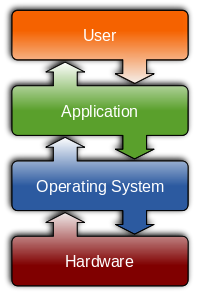The language and references we use in describing free and open source do matter. The predominance in the US of a highly commercialized computing environment and more recently app stores is relatively new and in stark contrast to the evolutionary foundations on which parts of our societies stand. When talking to people in my travels in this area I will commonly describe the computing environment as containing Microsoft Windows, Apple MacOS and this third alternative Linux. My work with Ubuntu Linux is the most promising starting point for less technically experienced people who are willing to make an effort to try Linux for themselves.
- Commons
- Science
Commons have been around for thousands of years. Digital commons were made possible when digital media, the Internet and free software. Due to popular misunderstandings some people proposed the use of open source though this has not been universally adopted and this term only properly refers to source code. Many related social movements have sprung up as described by the wikipedia Category:Open_methodologies. It is a corruption of the ideas to say that the opposite of private is always "big government."
example: public transportation – We discussed transportation at the meeting today quite a bit. We lamented the proliferation of traffic and automobiles in the SF Bay Area at the expense of public transportation like AC Transit, BART, ferries, the SF cable cars and the older East Bay Key System. The parallels of the National City Lines doing away with the Key System and reminds me of the legal use of patents and legislation in the US to take away one’s right to root their own mobile phone if purchased after January 26, 2013 and change the bootloaders of general computing devices using UEFI locking. Just because you are a conspiracy theorist doesn’t mean they aren’t out to get you, right? Time will tell.
"Scientific inquiry is generally intended to be as objective as possible in order to reduce biased interpretations of results. Another basic expectation is to document, archive and share all data and methodology so they are available for careful scrutiny by other scientists, giving them the opportunity to verify results by attempting to reproduce them." (wikipedia) The common practice of politicizing science seems to be in direct contrast to these aims.
example: Higgs Boson – For those familiar with the Fedora community and Scientific Linux , CERN’s announcement a few months ago of essentially finding the Higgs Boson (what gives mass to all matter) is not only a historic finding in physics but a proud example of the efforts of free and open source software being put to good use. The scientific method itself requires transparency and validation (full disclosure) which is impossible in secrecy. Scientific communities all over the world using open source and sharing their findings are leading adopters of the increasingly common use of transparently developed and secure applications and operating systems on servers, phones and desktops. CERN’s announcement is the culmination of decades of experiments and fulfills one of the primary reasons the Large Hadron Collider at CERN was built. Finding the Higgs boson turns out to be a tremendous counter example to the sometimes unscientific claims made by proprietary software vendors.
example: Trusted Computing – Last year Cory Doctorow gave a talk on the coming-century-war-against-your-computer. While security can be used to lock people out of their own purchased hardware it can also be used to validate that you are running exactly what you think you are running on your own hardware. I had not heard of a TPM or the Trusted Computing Group before listening to his talk.
The stereotype of user groups is narrow discussion of technical topics irrelevant to most people. My experiences at groups such as ours has not confirmed this stereotype. The BerkeleyLUG meets on the second and fourth Sunday of each month at Bobby G’s Pizzeria. I hope to see you at the next meeting scheduled in May.
